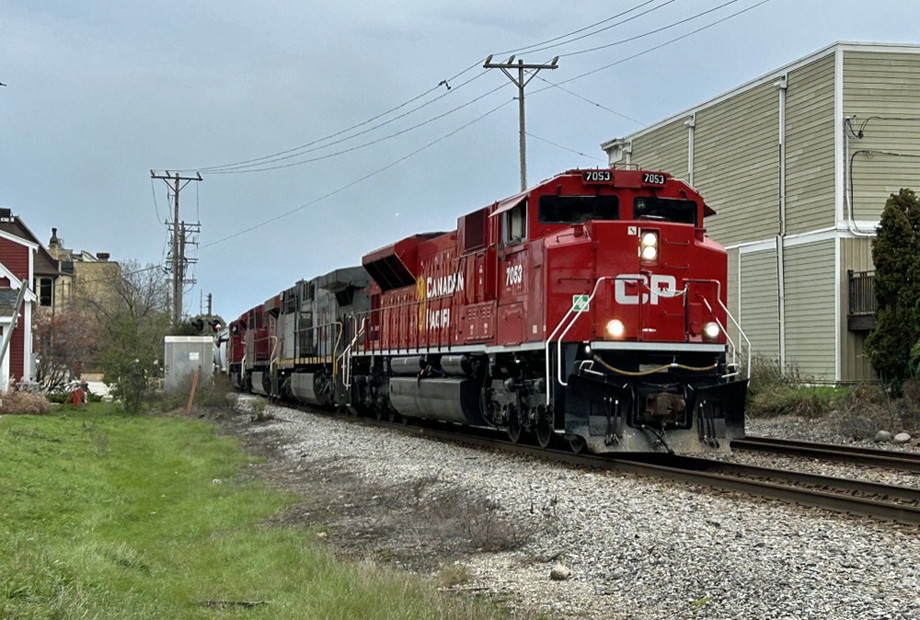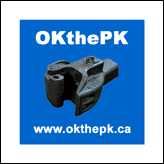
North America - You know it's been a big news year when the first merger of Class I railroads in
more than two decades, and likely the last, is judged the No. 3 story of 2023.
In a typical year, Canadian Pacific's US$31 billion acquisition of Kansas City Southern would have topped the
headlines.
The Surface Transportation Board approved the merger in March.
A month later, on 14 Apr 2023, Canadian Pacific Kansas City was born.
At a ceremony in Knoche Yard in Kansas City, the only place the two railroads touch, CEO Keith Creel drove home the
ceremonial spike to celebrate the creation of the first railroad to link Canada, the U.S., and Mexico.
That day CPKC also unveiled its new logo, a modified version of CP's iconic shield, beaver, and maple
leaf.
In June the railway introduced its locomotive livery, which employees selected from five options.
The paint scheme is CP red, features the CPKC beaver and shield logo on the long hood, and ends with a splash of gold
and black that begins at the radiator section of the locomotive.
No locomotives have yet emerged from the paint shop clad in the new livery.
At the railway's June investor day, executives dramatically increased the revenue growth anticipated from the CPKC
merger, saying they'll be able to capture more freight from other railroads and divert more trucks off the highway than
originally envisioned.
CPKC expects US$5 billion in revenue growth through 2028, a fivefold increase over the pre-merger outlook period that
covered the next three years.
"The pipeline is big," Chief Marketing Officer John Brooks said at the railway's investor day held in Kansas
City Union Station.
CPKC expects industry-leading growth through 2028 by gaining US$925 million worth of traffic from other railroads,
US$1.4 billion in truck-to-rail conversions; US$1.5 billion from industrial development and near-shoring projects, and
US$1.1 billion in other new business, including from transloads and partnerships with shortlines.
The more upbeat outlook was due to CPKC's ongoing conversations with customers and CP officials gaining control of KCS
once the merger became effective on 14 Apr 2023.
In the 60 days after the merger, CPKC's sales team combed over every commodity group and customer looking for
opportunities that could arise from the combined network.
CPKC in May launched the Mexico Midwest Express premium intermodal service linking Chicago, Kansas City, and Laredo,
Texas, with Monterrey and San Luis Potosi in Mexico.
Trains 180 and 181 are billed as the first truck-competitive, single-line, rail service option between the Midwest and
Mexico.
Schneider and Knight-Swift Transportation, which shifted their cross-border business to CPKC from Union Pacific, are
the train's anchor customers.
MMX trains make the 2,150 mile run between Bensenville, Illinois, and San Luis Potosi in four days.
"We're doing it at a trucklike speed. We're beating what we advertised, and that train is 95 percent, 96 percent
on time," Creel told an investor conference in September.
"I look at it every day, every morning. If it gets late I know about it. It is really symbolizing the power of
this extended haul network, and it's attracting business."
The MMX service prompted Canadian National, Union Pacific, and Ferromex to team up for Falcon Premium service that
links CN's terminals in Canada and Detroit with points in Mexico.
Like MMX, the service was launched in May. New UP CEO Jim Vena subsequently took 24 hours out of the schedule after he
rejoined the railroad in August.
BNSF Railway and intermodal partner J.B. Hunt on 1 Jan 2024 will shift their cross-border service away from CPKC and
the Laredo, Texas, gateway to a Ferromex routing via the Eagle Pass, Texas, gateway.
The service via Eagle Pass will be 24 hours faster than the current Chicago-Monterrey route, BNSF and J.B. Hunt
say.
The route is 5 percent shorter between Monterrey and BNSF's terminal in Alliance, Texas, where traffic can be routed to
various destinations on the BNSF system.
CN also signed an interline agreement with Norfolk Southern so that its intermodal customers could reach Kansas
City.
UP, meanwhile, began offering interline intermodal service between Mexico and the Southeast via connections with NS and
CSX at Memphis.
The new UP service will have a head start on cross-border service that CPKC and CSX say they'll begin late next year
assuming STB approval of their plan to acquire and upgrade Genesee & Wyoming shortline Meridian &
Bigbee.
The Meridian & Bigbee will serve as a link between CPKC's Meridian Speedway at Meridian, Mississippi, and CSX's
Montgomery, Alabama, hub.
CPKC will acquire the Meridian & Bigbee west of Myrtlewood, Alabama, while CSX will resume operations east of
Myrtlewood.
The deal will create a new corridor linking CPKC-served markets in Mexico and Texas with CSX-served markets in the
Southeast.
It's expected to attract intermodal shipments of auto parts, finish vehicle business, and forest products
traffic.
In November, Creel said he is not the least bit surprised at how rival Class I railroads have responded to the CPKC
merger by launching new and faster cross-border intermodal service.
"We're creating competition and this industry is getting stronger as a result," Creel told the RailTrends
conference.
"The UP, they've introduced their service. They've always had the best route to the border, but they never had the
best transit time. Now they're inspired to compete and are matching, with their combined three-line move, similar
transit times," Creel says.
"And then, BNSF and J.B. Hunt got into the fray, too. And they are shaving time off their existing transit times.
So you've got three railroads that are motivated, that are inspired."
Creel says Class I railroads got complacent after the last round of mergers two decades ago.
"When you're not challenged, and this is human nature, this is railroading nature, this is any business nature,
this is competitive sport nature, this is just a fact of life, sometimes complacency can set in," Creel
says.
"And this industry is in a place where we needed to be better. We need to be better for all stakeholders, not just
our own, but for this nation."
The rail competition will extend to automotive and merchandise traffic, as well, Creel says.
With 10,000 trucks crossing the U.S.-Mexico border at Laredo every day, Creel says there is plenty of business to go
around for CPKC, UP, and BNSF to all be successful.
Bill Stephens.
(likely no image with original article)
(usually because it's been seen before)
provisions in Section 29 of the
Canadian Copyright Modernization Act.
